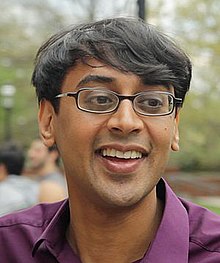Manjul Bhargava | |
|---|---|
 Manjul Bhargava in 2014 | |
| Born | 8 August 1974 Hamilton, Ontario, Canada |
| Nationality | Canada United States |
| Education | Harvard University (AB) Princeton University (PhD) |
| Known for | Bhargava factorial Bhargava cube 15 and 290 theorems average rank of elliptic curves |
| Awards | Fellow of the Royal Society (2019) Padma Bhushan (2015) Fields Medal (2014) Infosys Prize (2012) Fermat Prize (2011) Cole Prize (2008) Clay Research Award (2005) SASTRA Ramanujan Prize (2005) Blumenthal Award (2005) Merten M. Hasse Prize (2003) Morgan Prize (1996) Hoopes Prize (1996) Hertz Fellowship (1996) |
| Scientific career | |
| Institutions | Princeton University Leiden University University of Hyderabad |
| Thesis | Higher composition laws (2001) |
| Doctoral advisor | Andrew Wiles[1] |
| Doctoral students | |
| Website | www |
Manjul Bhargava FRS (born 8 August 1974)[2] is a Canadian-American mathematician. He is the Brandon Fradd, Class of 1983, Professor of Mathematics at Princeton University, the Stieltjes Professor of Number Theory[3] at Leiden University, and also holds Adjunct Professorships at the Tata Institute of Fundamental Research, the Indian Institute of Technology Bombay, and the University of Hyderabad. He is known primarily for his contributions to number theory.
Bhargava was awarded the Fields Medal in 2014. According to the International Mathematical Union citation, he was awarded the prize "for developing powerful new methods in the geometry of numbers, which he applied to count rings of small rank and to bound the average rank of elliptic curves".[4][5][6] He was also a member of the Padma Award committee in 2023.[7]
- ^ Manjul Bhargava at the Mathematics Genealogy Project
- ^ Gallian, Joseph A. (2009). Contemporary Abstract Algebra. Belmont, CA: Cengage Learning. p. 571. ISBN 978-0-547-16509-7.
- ^ "Fields Medal for Leiden Professor of Number Theory Manjul Bhargava" (Press release). 13 August 2014. Retrieved 13 August 2014.
- ^ "Fields Medal 2014" (Press release). International Mathematical Union. Retrieved 10 February 2021.
- ^ "Press Release - Manjul Bhargava" (PDF). International Mathematical Unioin. 10 February 2021.
- ^ "Fields Medallists 2014 awardees with brief citations | International Mathematical Union (IMU)". www.mathunion.org. Retrieved 9 February 2021.
- ^ "Padma Awards Committee" (PDF). Ministry of Home Affairs. April 2023. Retrieved 21 August 2024.